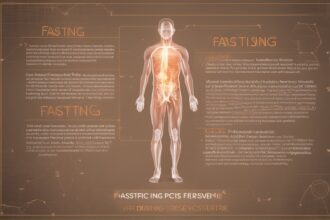Hey there, health enthusiasts! If you’ve ever wondered whether fasting is just a passing trend or a legitimate health strategy, you’re in the right place. Today, we’re diving deep into scientific fasting studies to uncover what the research really says about fasting. From weight loss to longevity, fasting has been making waves in the health world, but it’s the evidence-based insights that truly matter. Let’s explore the science behind fasting, break down key findings, and share practical tips to help you decide if it’s right for you. Whether you’re a seasoned faster or just curious about intermittent fasting research, this post will give you a clear picture of what’s fact and what’s hype.
The Rise of Fasting in Modern Health Research
Fasting isn’t new—humans have practiced it for centuries, often for religious or cultural reasons. However, in recent decades, scientific fasting studies have brought it into the spotlight as a potential health tool. Researchers are now exploring how fasting impacts everything from metabolism to brain health. Studies on intermittent fasting (IF), time-restricted eating (TRE), and prolonged fasting have revealed promising results, sparking interest among scientists and everyday folks alike. What’s driving this buzz? It’s the growing body of evidence suggesting that fasting could help with weight management, reduce inflammation, and even slow aging. But let’s not get ahead of ourselves—let’s look at what the data actually shows.
Key Findings from Scientific Fasting Studies
When it comes to fasting health research, the results are both exciting and complex. One of the most studied areas is intermittent fasting, which typically involves cycles of eating and fasting (like the 16:8 method, where you fast for 16 hours and eat during an 8-hour window). Studies published in journals like Obesity and The New England Journal of Medicine have shown that IF can lead to significant weight loss by reducing overall calorie intake and improving insulin sensitivity. Beyond weight loss, fasting research studies have linked this practice to lower blood pressure, improved cholesterol levels, and reduced markers of inflammation. However, not all studies are conclusive—some suggest that the benefits depend on individual factors like age, lifestyle, and pre-existing health conditions.
Fasting and Cellular Health: The Autophagy Connection
One of the most fascinating discoveries in scientific fasting studies is the role of autophagy—a process where cells clean out damaged components and recycle them for energy. Research, including a landmark study by Yoshinori Ohsumi (who won the Nobel Prize in 2016 for his work on autophagy), shows that fasting can trigger this cellular “housekeeping.” During fasting, when energy from food is scarce, the body ramps up autophagy to maintain balance. This process is thought to protect against diseases like cancer and Alzheimer’s, though human studies are still in early stages. While the potential is thrilling, scientists caution that more evidence-based fasting research is needed to fully understand how this works in everyday life.
Potential Risks and Limitations of Fasting
While the benefits of fasting are backed by many fasting research studies, it’s not a one-size-fits-all solution. Some studies highlight potential downsides, especially for certain groups. For instance, fasting can lead to irritability, fatigue, or even disordered eating patterns if not done mindfully. Research in the Journal of Clinical Nutrition notes that prolonged fasting may cause nutrient deficiencies if nutritional needs aren’t met during eating windows. Additionally, people with diabetes, pregnant women, or those with a history of eating disorders should consult a healthcare provider before starting any fasting regimen. The science of fasting is promising, but it’s crucial to approach it with caution and personalization.
Practical Tips for Starting a Fasting Routine
Ready to give fasting a try based on insights from scientific fasting studies? Here are some actionable tips to help you start safely and sustainably. Remember, the goal isn’t to push your body to extremes but to find a rhythm that works for you.
- Start small: If you’re new to fasting, try a 12:12 schedule (12 hours fasting, 12 hours eating) before jumping into more intense methods like 16:8.
- Stay hydrated: Drink plenty of water during fasting periods to avoid dehydration, which can mimic hunger pangs.
- Focus on nutrient-dense foods: When you break your fast, prioritize whole foods like vegetables, lean proteins, and healthy fats to support your body.
- Listen to your body: If you feel dizzy or overly fatigued, take a break and reassess your approach with a professional.
- Track progress: Use a journal or app to monitor how fasting affects your energy, mood, and weight over time.
How to Stay Informed About Fasting Research
The field of fasting health research is evolving rapidly, with new studies published regularly. Staying updated can help you make informed decisions about your fasting journey. Here’s how to keep up with the latest findings without getting overwhelmed by misinformation.
- Follow reputable sources: Check journals like Nature or PubMed for peer-reviewed fasting research studies.
- Join online communities: Engage with fasting-focused forums or social media groups where members share evidence-based insights.
- Read books by experts: Authors like Dr. Jason Fung offer accessible breakdowns of intermittent fasting research.
- Attend webinars: Many nutritionists and researchers host free talks on the science of fasting—look for events on platforms like Eventbrite.
In wrapping up, it’s clear that scientific fasting studies offer a wealth of insights into how fasting can benefit our health—from boosting metabolism to potentially enhancing cellular repair through autophagy. However, the research also reminds us to approach fasting with balance and awareness of its risks. Whether you’re intrigued by the weight loss potential or the promise of long-term wellness, the key is to use evidence from fasting health research as your guide. Start small, stay informed, and always prioritize your body’s unique needs. Have you tried fasting based on scientific findings, or are you just starting to explore it? Drop your thoughts or questions below—I’d love to hear your story and keep this conversation going!






